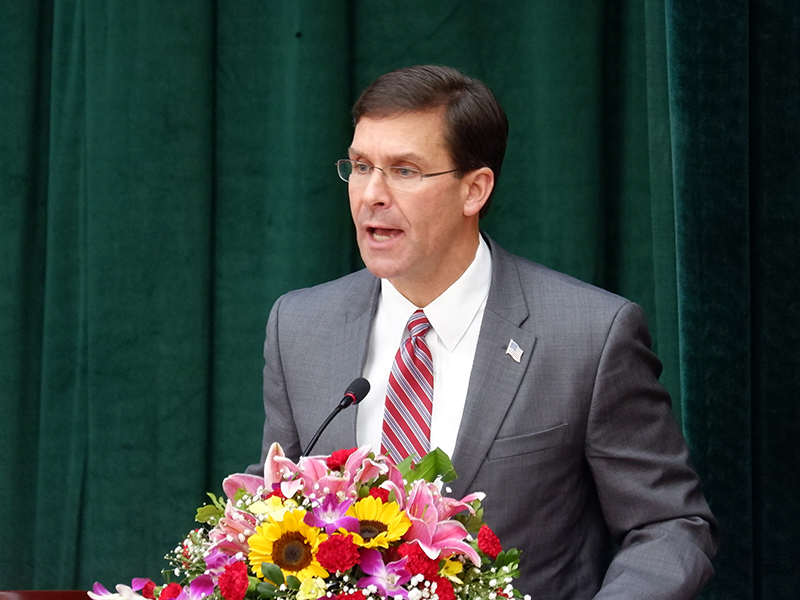US supports Vietnam to fight “might makes right” approach
The two countries will stand against the behavior which is full of coercion, aggression, and intimidation.
The US will continue to work together with Vietnam to sustain a free and open Indo-Pacific environment based on principles that support the rights of all nations, big and small, to avoid the “might makes right” approach to international relations.
| US Secretary of Defense Mark T. Esper delivers a speech at the Diplomatic Academy of Vietnam in Hanoi on November 20. Photo: Minh Tuan |
As Vietnam has experienced first-hand, the vision of rules-based order with cooperation, trust, and respect is regrettably not shared by all, the US will remain fully engaged in the Indo-Pacific, US Secretary of Defense Mark T. Esper said in a speech in Hanoi on November 20.
Coercion, aggression, and intimidation – the tools of statecraft best left in a previous era – remain alive and well today. But as the Trung sisters showed the Han Dynasty nearly 2,000 years ago, Vietnam is a nation that – like the US – will never accept a “might makes right” proposition, Mark Esper said in a statement at the Diplomatic Academy of Vietnam (DAV).
Today, most of the world would consider this approach antiquated and contrary to the principles requiring responsible nations to abide by, he added.
Southeast Asian nations are increasingly being subjected to coercion and intimidation in ways that challenge the fundamental underpinnings of the free and open, rules-based order.
“What we are currently witnessing in the South China Sea is a prime example of this behavior. The long period of peace, which enabled the economic rise of nearly every Asian nation, is yielding to a renewed style of Chinese conduct that infringes on the sovereign rights of other states,” Esper stressed.
This behavior have been most recently witnessed in Malaysia, the Philippines, and Vietnam with the harassment of the country’s long-standing oil and gas activities around Vanguard Bank inside Vietnamese exclusive economic zone.
Combined with reclamation and militarization of disputed outposts in the South China Sea, China’s unilateral efforts to assert illegitimate maritime claims threaten other nations’ access to vital natural resources, undermine the stability of regional energy markets, and increase the risk of conflict.
“Together, we can stand against this behavior,” he said, adding that united efforts and steadfast partnership enable the countries to enforce the norms of responsible international conduct, ensuring that a free and open order prevails.
Mark Esper emphasized that the US resolve to uphold this environment is deep-rooted and has only grown stronger in the face of efforts to undermine it.












